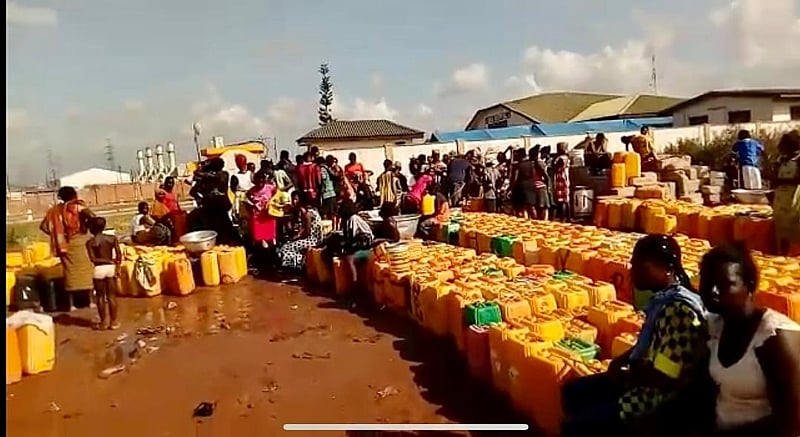The Greater Accra Region of Ghana is grappling with a pervasive water crisis, leaving residents frustrated and struggling to cope with the disruption to their daily lives. The inconsistent and often non-existent water supply is not merely an inconvenience; it’s a significant financial burden, particularly for small businesses that rely on water for their operations. Food vendors and other entrepreneurs in areas like Nungua’s Leisure Street are forced to purchase water from private vendors at exorbitant prices, eating into their already slim profit margins. The cost of this essential resource, which should be readily available through public utilities, is becoming unsustainable, threatening the livelihoods of many. The sight of large water storage containers, from gallons to drums, has become ubiquitous across affected communities, a stark visual representation of the lengths residents must go to secure this basic necessity. The scarcity has persisted for weeks, and in some cases, months, leaving taps dry and forcing residents to drastically alter their daily routines.
The Ghana Water Limited (GWL) attributes the erratic supply to a rationing program implemented due to the limitations of existing treatment plants struggling to keep pace with the burgeoning water demands of Accra’s growing population. This explanation, however, offers little solace to residents who are bearing the brunt of the crisis. The rationing program, while perhaps necessary from an infrastructure standpoint, appears to be unevenly implemented, leaving some communities with extended periods of complete water outage. The situation isn’t limited to outlying areas; central neighborhoods like Tudu are experiencing similar hardships. Retailers, already facing economic pressures, find themselves in the ironic position of selling water while struggling to secure enough for their own personal and business needs, highlighting the pervasive nature of the crisis. The monthly water bills, arriving despite the lack of service, add insult to injury, further fueling residents’ frustration and resentment.
The impact of the water shortage extends beyond households and businesses, significantly affecting students living in hostels across the affected zones. Their daily routines, including studying and personal hygiene, are severely disrupted by the unreliable access to water. This disruption has the potential to negatively impact their academic performance and overall well-being. While follow-up visits to some communities have shown marginal improvements in a few select areas, with partial restoration of water flow, the situation remains precarious. The inconsistency of the supply, even in areas experiencing some relief, necessitates continued reliance on stored water, perpetuating the cycle of anxiety and uncertainty surrounding access to this fundamental resource.
The situation in communities like Peace Bee in Tema Community 25 remains particularly dire. Residents have endured nearly three months without any piped water supply, forcing them to rely on expensive water deliveries from private vendors. The cost of these deliveries, which can reach upwards of GHS 1,100 for just three weeks’ worth of water, places an immense strain on household budgets. Even basic domestic chores become arduous tasks without readily available water, adding another layer of difficulty to daily life. The financial and logistical burdens imposed by the water shortage are pushing many households to their limits, highlighting the urgent need for a sustainable solution.
The GWL, while acknowledging the challenges, has urged residents to adopt a proactive approach by storing water whenever it becomes available. This advice, while practical in the short term, underscores the underlying issue of unreliable and insufficient supply. The onus of managing the crisis is effectively shifted to the residents, who are expected to adapt to the unpredictable nature of the water supply. While individual storage can mitigate some of the impact, it does not address the root cause of the problem: the inadequate capacity of the existing water infrastructure. The GWL’s recommendation, while helpful for individual coping mechanisms, does not offer a long-term solution to the systemic issues plaguing the region’s water supply.
The ongoing water crisis in the Greater Accra Region paints a concerning picture of a critical infrastructure failing to meet the needs of a growing population. The impact on residents is multifaceted, affecting their livelihoods, daily routines, and overall well-being. While the GWL’s rationing program and advice to store water are attempts to manage the crisis, they fall short of addressing the fundamental need for increased capacity and improved infrastructure. The experiences of residents, from struggling business owners to students facing disrupted routines, underscore the urgency of finding a sustainable solution to this pressing issue. The continued reliance on expensive private water vendors and the constant anxiety surrounding water availability highlight the need for immediate and long-term investment in the region’s water infrastructure to ensure reliable access to this essential resource for all residents.


